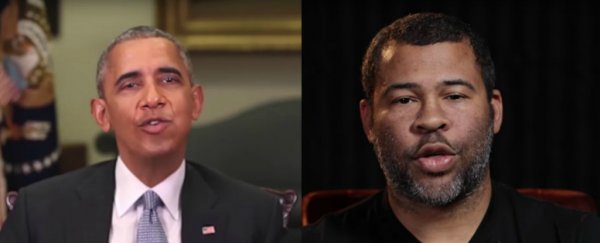A realistic-looking video that seemed to show former President Barack Obama cussing and calling President Donald Trump a "total and complete dips—," went viral on Tuesday, bringing attention to the dangers of a controversial video-editing technology that many have called "the future of fake news."
About halfway through the video, originally published by BuzzFeed, it is revealed that Obama had actually not uttered those words and that they were actually said by Get Out director and writer Jordan Peele, whose voice and mouth had been digitally inserted into an original - much less scandalous - video of the former president.
Here's the full video:

Peele, BuzzFeed, and Monkeypaw Productions used a controversial but widely available software to make the video, in an effort to demonstrate the dangers of "deepfakes," aka digitally manipulated videos that have the power to "make it look like anyone is saying [or doing] anything at any point in time," that didn't actually happen.
According to BuzzFeed, the video took 56 hours to make, along with the assistance of a professional video editor.
"So the good news is it still requires a decent amount of skill, processing power, and time to create a really good 'deepfake,'" said BuzzFeed's news-media editor, Craig Silverman, in a post that accompanied the video.
Unfortunately, this technology is already being used by nonexperts for nefarious purposes, including inserting the faces of celebrities into pornographic videos, creating, in some instances, very convincing and disturbing results.
Deepfakes are most commonly created with the free AI software, FakeApp, that was popularised in forums dedicated to the sharing of fake videos on Reddit and Discord, and first reported on by Motherboard in December 2017.
The software requires a large number of photos of the person whom the user wishes to insert into a video, so celebrities and public figures - like former presidents - have become naturally easy targets.
Even beyond nonconsensual pornography, the greatest potential dangers for this technology have only begun to emerge.
Many experts have begun to ask what this technology, along with sophisticated audio editing, could mean for the future of fake news and media in general.
"It may sound basic, but how we move forward in the age of information is going to be the difference between whether we survive or whether we become some kind of f—ed-up dystopia," says Peele, in unison with the artificial Obama, who eerily and convincingly utters the same words.
This article was originally published by Business Insider.
More from Business Insider:
